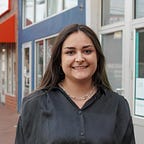DC is at the center of a historic refugee crisis — and local advocates are struggling
This story was produced as part of HumanitiesDC’s Community Journalism Program.
While still in anguish after fleeing a war zone, the more than 97,000 asylum-seekers who have settled in the U.S. since the Afghan government collapse now face a new slate of logistical, financial, and emotional challenges.
The displacement has become one of the world’s largest protracted refugee crises following the U.S. military’s abrupt withdrawal from its war in Afghanistan almost three years ago. And as the DMV has one of the country’s largest Afghan immigrant communities, it’s been a common destination for these asylum-seekers.
One such nonprofit aims to make resettling in the D.C. area slightly less stressful. Homes Not Borders’ (HNB) mission is to provide refugees and other forced migrants in the DC area with what they need to thrive and feel at home in the United States. They also provide job training and run an artisan program that teaches people how to make home goods that are later sold on their behalf or used to furnish homes for other migrants.
Until earlier this year, the organization’s Moving Up Fund also provided rent assistance money to migrants — many of whom have advanced degrees from universities that are unaccredited in the U.S. — so they can get job training that will increase their wages.
“In order to take the job training, they need to take time off from their other jobs. It’s kind of a Catch-22,” said Laura Osuri, executive director of HNB. But dealing with limited funding and overwhelming need, HNB suspended the program.
As refugees deal with these challenging paradoxes, the clock is steadily ticking. Many have “Temporary Protected Status,” a program that allows migrants from countries deemed unsafe by the federal government to stay and work in the U.S. for up to 18 months. And despite recent steps forward by the government — extending TPS for Afghan refugees as conditions in the country worsened, and expanding an online portal designed to smooth the immigration process — many migrants feel leaps away from stability.
“It is overwhelming,” said Manizha Azizi, the family services manager at HNB. “We try to eliminate some of that bombardment.” But as the number of families seeking asylum has grown, organizers like Azizi have become accustomed to filling roles that go well beyond their job descriptions. Many of them text her directly for help navigating the complex systems of housing, public transportation, employment, school enrollment, and childcare.
“I’m having to reintroduce them to some of the things that might have already been covered by the resettlement agency — or supposedly covered by the resettlement agency. But at that time, they were in such a haze because there was just so much coming at them,” Azizi says.“I will get a bunch of random questions regarding immigration or the application process or how do I do this and how do I do that? And I don’t always have the answer.”
Without proper funding and a system that is at capacity, organizations like HNB still do what they can to help. Most importantly, they’re learning the importance of building personal connections that are hard to come by during resettlement. “People feeling isolated, especially the women who don’t know the language and are at home oftentimes with kids,” Osuri said. “I think trying to build those connections was just you know, something we didn’t realize.”
The staff at Homes Not Borders is not alone in their battle, Osuri is quick to add, as she rattles off a handful of other non-profits they liaise with. “Fortunately, there is a good network of organizations in the DC area,” she says.
Here’s a list of organizations supporting Afghan refugees in the DMV, including Homes Not Borders.
